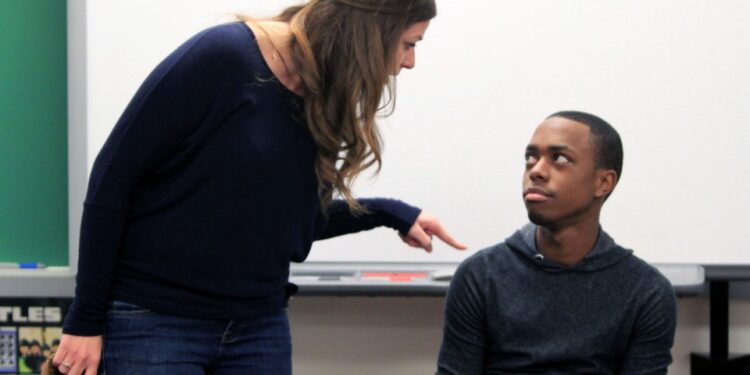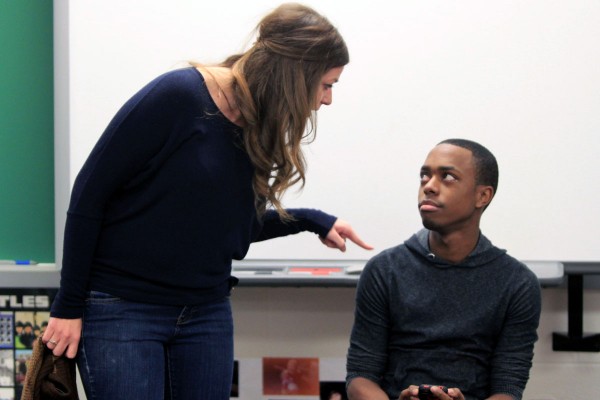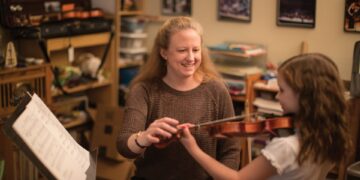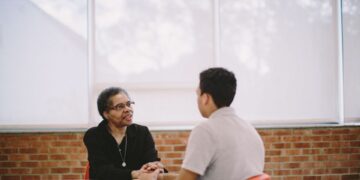I can’t believe this,” Troy says.
“Sorry, Troy,” Nate replies.
“Yeah, me too…f**,” Troy says, using a homophobic epithet as he walks away.
And that starts it all.
Nate’s voice is full of defeat, shoulders slumped, face downcast. Even with glasses, tattered baseball cap and a plaid shirt, Troy is menacing compared to a shorter Nate.
Put yourself there. What would you do next?
This is just one scenario RESPECT, an anti-bullying group here in Omaha, poses to teenagers. Using short theatrical productions, RESPECT hopes to educate youth on how to handle abusive relationships. Standing Up, by Nick Zadina, is just one example of 14 plays these professional actors perform for schools around Nebraska and Iowa.
Executive Director Patricia Newman founded RESPECT as a problem-solving and communication tool for children of all ages. Bullying won’t ever go away, she says, but it can be decreased by education.
Newman, a clinical child physiologist, is hoping students will stop unhealthy and violent patterns early before reaching adulthood. “Kids can self-identify and change their bullying habits,” Newman believes. “The more times you hear it, it clicks.”
Just this year, the Centers for Disease Control reported 19.6 percent of high school students have been bullied sometime during the school year. Newman recalls being picked on as a child because she was poor and from a divorced home. Luckily, she says teachers made the difference by making her feel special. “The power in the classroom is amazing,” Newman says. Millard West junior Cody Janke says Standing Up was realistic and “not your average corny play you see in school.”
Once the play finishes, the actors allow students a few moments to write down anonymous questions on notecards. Greg, one of the 10 professional actors for RESPECT, pauses before responding to one student’s question, “Have you ever been bullied?”
Greg (RESPECT actors asked that only their first names be used) mentions how someone at school had once left a death threat in his locker after he talked to the bully’s girlfriend.
“I was terrified and a freshman so had no idea what to do,” Greg recalls. He ended up reporting the incident to counselors who helped the bully with his anger and jealousy.
The class is quiet and not quick to volunteer, so the RESPECT actors change things up by role-playing. One of the actors plays the part of the bully as he knocks books out of another actor’s hands.
“Okay, okay, so what would you do?” he asks the class.
One brave student, freshman Dan Catania, volunteers to role-play as the bystander. His shaggy brown hair covers his face as he picks up the books scattered on the floor.
“Dude, why did you do that?” Dan asks the actor. “Now, say you’re sorry.”
With an infectious grin, he apologizes and tells Dan “good job.”
With 251 programs each year and around 40,000 students, Newman hopes stepping into the action will teach kids from preschool to college to empower themselves and come up with their own solutions to make their lives safer.
After the RESPECT team leaves, most of the students agree bullying occurs mainly in middle school. Janke, a high school football running back, believes many teenagers outgrow these negative tendencies. Tall and muscular with a bit of a five o’clock shadow, he admits to being the bully once in middle school, although feels some of it was provoked. Now that he is older and more mature, he says he feels it isn’t worth it to put other people down.
Many students also say girls tend to be worse in middle school than boys. One of the freshman female students says boys are more willing to talk it out, while girls do everything on social media or behind someone’s back. Although statistics show boys are 1.7 times more likely than girls to bully, girls show a higher trend of victimizing others through rumors. “They (girls) are vicious,” she says with a laugh. “Guys are just like, ‘Bro, what are you doing?”
Newman agrees bullying today is deadlier because of the intensity and how quickly it happens on social media. She hopes RESPECT will give students one more tool to transform something negative into a positive.
Newman shares a touching letter she received from one boy:
“Thank you. You may have saved my life.”














